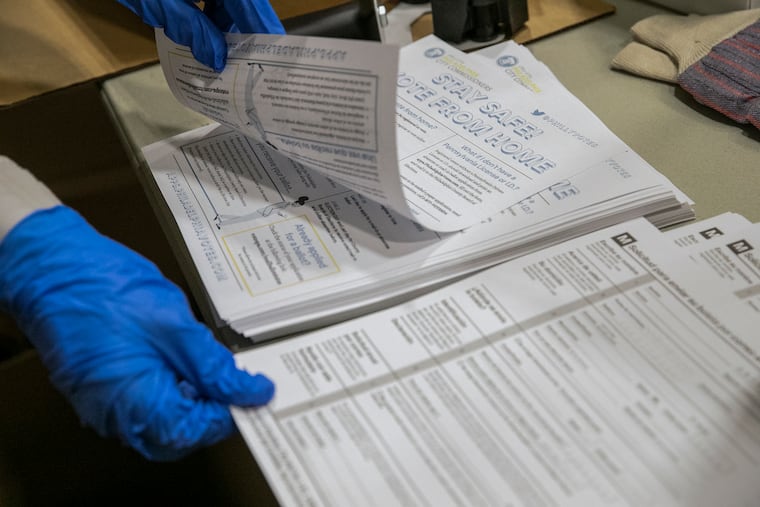Philly voters have requested more mail ballots than all of Pennsylvania did in 2016
In what could be a coronavirus-era milestone, Philadelphia elections officials project a majority of votes in the June 2 primary will be cast by mail.

The difference is so huge, it sounds like a mistake at first.
As of Wednesday, almost 23 times as many Philadelphia voters had requested mail ballots as did for the 2016 primary. So many voters — more than 145,000 — that the number in Philadelphia alone already exceeds the statewide total from four years ago.
And in what could be a coronavirus-era milestone, Philadelphia elections officials project a majority of votes in the June 2 primary will be cast by mail. The percentage is normally in the low single digits.
The number of mail ballot requests continues to grow — and at an increasing rate.
At the beginning of last month, elections officials were processing several hundred requests for mail ballots each day. By the end of April, there were 3,000 requests a day. Now, it’s more than 4,500.
The number will continue to grow ahead of Tuesday’s deadline for requesting mail ballots.
“We expect a big push this week,” said Omar Sabir, one of the three Philadelphia city commissioners, who oversee elections. “We expect at the deadline to increase our number.”
There are two primary reasons for the sudden flood of mail-in ballots.
The first is structural: Anyone can now vote by mail under a new state law. In the past, absentee ballots were tightly restricted to people who were truly unable to vote in person, and only about 5% of votes were cast absentee in any election. (Due to a quirk in the law, Pennsylvania technically has two kinds of mail ballots, “absentee” and “mail-in,” that are functionally the same for voters.)
A major change to Pennsylvania election law last year removed those barriers, and the 2020 primary is the first election in which anyone, for any reason, can vote by mail.
And then, of course, there’s the coronavirus pandemic.
“Here we are in a June pandemic election," said Lisa Deeley, chair of the city commissioners. “Luckily, fortuitously, we were able to do this [vote-by-mail] without an excuse.”
The pandemic makes it hard to know whether the high volume of requests will change things in the long run, Deeley said.
“It’s a one-off; this is not the way Philadelphians would choose to vote in normal circumstances,” she said. “We want to go back to restaurants, we want to go back to bars, we want to go back to movies.… We hope everything will go back to the way it was with voting.”
Some voters are likely to change their behavior even after the pandemic subsides. Generally after states expand vote-by-mail, they see gradual adoption over the course of several years, and many voters who find it convenient in one election continue doing so in the future.
That’s what Sabir expects to do.
“The process was easy, it was simple, and I think that’s the way I want to be voting in the future, to be honest with you," he said.
Sabir said voting at physical polling locations has been a sacred ritual for him because of the long fight for black Americans to secure the right to vote. “Every time, it’s like we’re walking on hallowed ground,” he said.
But Sabir said voting at home still felt special and was so convenient and safe that it’s his preferred method for the future.
“Alternative voting” methods such as early in-person voting and voting by mail have risen in popularity across the country, with about two out of five votes now cast in some method other than at the polls on Election Day. Pennsylvania long resisted that trend.
When last year’s election law was passed, state elections officials predicted about 20% of votes statewide would come by mail, already four times higher than the past. Coronavirus fears could send them soaring past that mark.
Philadelphia used to have much lower absentee-voting rates than other counties (previous law made it particularly hard for some to vote absentee). But this year, the city appears to be jumping to the head of the pack.
The number of mail ballots requested has increased at a greater rate in Philadelphia than in any other county. Across the state, there have been more than 13 times as many requests this year as in 2016.
Despite having far and away the most registered and active voters in the state, Philadelphia tends to come behind Montgomery and Allegheny Counties when it comes to total absentee ballots.
This year, Philadelphia continues to trail Allegheny, home to Pittsburgh, but has jumped ahead of Montgomery County.
Want to vote by mail? Here’s what you need to know. Applications are due by 5 p.m. Tuesday, May 26. Completed ballots must be returned to county elections officials by 8 p.m. election day, June 2. (Postmarks don’t count.)